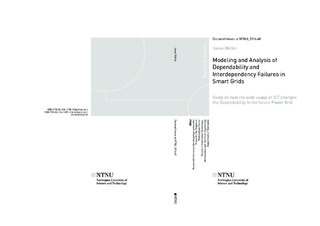Modeling and Analysis of Dependability and Interdependency Failures in Smart Grids: Study on how the wide usage of ICT changes the Dependability in the future Power Grid
Abstract
The transition from the current electrical power grid towards a smart grid is driven by new technologies and services. Traditional dedicated power grid components are exchanged with more powerful and highly configurable devices that are interconnected and help monitoring and controlling the power grid. The power grid is a critical infrastructure with high dependability requirements. The pervasive use of information and communication technology (ICT) to support the operation in the smart grid creates a complex interdependent system in which the dependability of the ICT systems plays an important role for the overall dependability. Additionally, interdependent system-of-systems feature new failure modes not found in simple systems. Therefore, it becomes crucial to understand and address the dependability issues in the smart grid in order not to risk a decreasing dependability with the introduction of new technology.
The objective of this thesis has been to analyze how the dependability of the power grid changes with the introduction of smart grid technologies, to propose new dependability models and propose operational support mechanisms for the control center to detect and master the expected dependability issues in the smart grid. The first step of the research was to conduct literature studies to find new dependability challenges in the smart grid. Based on that, the consequences of these new challenges are assessed with the help of analytical models and simulations.
My findings show that there are several challenges such as cascading and escalating failures, latent errors and a risk of automation waiting when transitioning towards a smart grid. The qualitative and quantitative analysis show that these effects can have a strong impact on the total dependability of the smart grid and need to be considered. The analysis also shows that smart services like demand response or automatic detection and isolation of failures can help improving the dependability if implemented with the right supporting measures. As a conclusion from the analysis, I give a list of guidelines for the control center on how to address the future challenges. One of the central advices from this thesis to the electrical utilities is, that they should try to thoroughly understand their specific interdependencies by analyzing their systems, processes and organizational structure. The next step is then to create awareness inside the company and invest in preparedness and mitigation strategies.
Overall, this thesis contributes to the discussion on new dependability challenges in the smart grid, the definition of realistic use cases illustrating how they might affect the system, the quantification of their consequences, and the discussion on how the utilities might address these new challenges.
Has parts
Paper A: Wäfler, Jonas; Heegaard, Poul Einar. Interdependency Modeling in Smart Grid and the Influence of ICT on Dependability. Lecture Notes in Computer Science 2013 s. 185-196 - The final publication is available at Springer via http://dx.doi.org/10.1007/978-3-642-40552-5_17Paper B: Wäfler, Jonas; Heegaard, Poul Einar. A Combined Structural and Dynamic Modelling Approach for Dependability Analysis in Smart Grid. I: Proceedings of the 28th Annual ACM Symposium on Applied Computing. Association for Computing Machinery (ACM) 2013 ISBN 978-1-4503-1656-9. s. 660-665 - Is not included due to copyright avialable at http://dx.doi.org/10.1145/2480362.2480489
Paper C: Wäfler, Jonas; Heegaard, Poul Einar. Structural Dependability Analysis in Smart Grid under Simultaneous Failures. I: Proceedings of 2013 IEEE International Conference on Smart Grid Communications (SmartGridComm). IEEE Press 2013 ISBN 978-1-4799-1526-2. s. 67-72 http://dx.doi.org/10.1109/SmartGridComm.2013.6687935 - (c) 2016 IEEE. Personal use of this material is permitted. Permission from IEEE must be obtained for all other users, including reprinting/ republishing this material for advertising or promotional purposes, creating new collective works for resale or redistribution to servers or lists, or reuse of any copyrighted components of this work in other works.
Paper D: Wäfler, Jonas; Heegaard, Poul Einar. Quantifying Influence of Strategies and Network Properties in Repairing Simultaneous Failures in Smart Grid. NIK: Norsk Informatikkonferanse 2014 s.
Paper E: Wäfler, Jonas; Heegaard, Poul Einar. How to Use Mobile Communication in Critical Infrastructures: A Dependability Analysis. Lecture Notes in Computer Science 2015 ;Volum 9338 - The final publication is available at Springer via http://dx.doi.org/10.1007/978-3-319-24249-1_29
Paper F: Wäfler, Jonas; Heegaard, Poul Einar. Interdependency in Smart Grid Recovery. I: 7th International Workshop on Reliable Networks Design and Modeling (RNDM 2015). IEEE Computer Society 2015 ISBN 978-1-4673-8049-2. s. 201-207 http://dx.doi.org/10.1109/RNDM.2015.7325230 (c) 2016 IEEE. Personal use of this material is permitted. Permission from IEEE must be obtained for all other users, including reprinting/ republishing this material for advertising or promotional purposes, creating new collective works for resale or redistribution to servers or lists, or reuse of any copyrighted components of this work in other works.
Paper G: Heegaard, Poul Einar; Helvik, Bjarne Emil; Nencioni, Gianfranco; Wäfler, Jonas. Managed Dependability in Interacting Systems. I: Principles of Performance and Reliability Modeling and Evaluation Essays in Honor of Kishor Trivedi on his 70th Birthday. Springer 2016 ISBN 978-3-319-30597-4. s. 197-226 - The final publication is available at Springer via http://dx.doi.org/10.1007/978-3-319-30599-8_8
